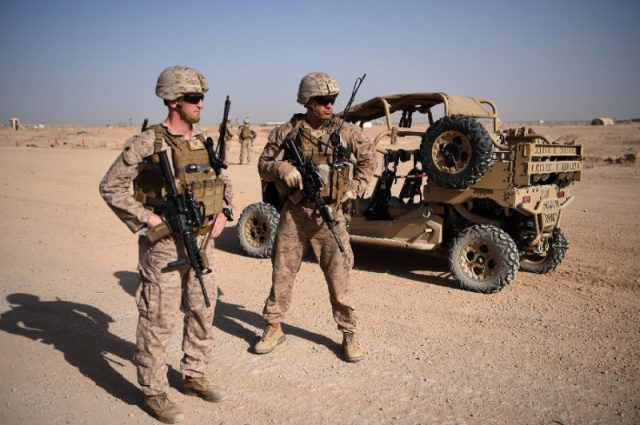AFP |
Six people were killed when a suicide bomber blew himself up in Kabul Monday, close to where scores of Afghans had been protesting against Taliban attacks on the minority Hazara ethnic group. The attack is the latest in a wave of violence across war-torn Afghanistan as the Taliban intensify pressure on beleaguered government security forces, which are suffering record-high casualties.
Interior ministry spokesman Najib Danish said 20 were wounded in the blast, which struck in front of a high school in the downtown area of the Afghan capital. Initial reports indicated most of the victims were members of the security forces, but Danish said civilians, including several women, had borne the brunt of the carnage.
The Taliban, which are Sunni and largely ethnic Pashtuns, have been accused of committing human rights violations against the group during their oppressive 1996-2001 rule.
A photo shared on WhatsApp showed several bodies lying on the ground. “The suicide attacker on foot wanted to target protesters, but he was stopped at a security checkpoint some 200 meters (yards) from the site,” interior ministry deputy spokesman Nasrat Rahimi said.
A police officer at the scene said he saw 10 to 15 casualties on the ground, as well as body parts. The center of Kabul was blanketed with heavier-than-usual security for the protest, which began on Sunday night and continued into Monday. “It was a huge blast near Istiqlal high school, very close to where the demonstrators were gathering,” witness Qais Nawabi told AFP.
The Islamic State group (IS) claimed responsibility for the attack, it’s propaganda agency Amaq said. IS has claimed most suicide attacks in Kabul in recent months. Demonstrators, including university students, had taken to the streets to demand the deployment of military reinforcements to two Hazara-dominated districts in the southeastern province of Ghazni which have been attacked by the Taliban.
Read more: Suicide attack on Kabul election workers kills one, wounds six
In other violence, a Taliban attack on Khak Safid district in the western province of Farah overnight killed up to 40 local police and civilians, provincial council member Dadullah Qaneh told AFP. “They set the houses of local police members on fire, killed women and children and local police,” Qaneh said.
Provincial police spokesman Mohibullah Mohib confirmed the attack but had no information on the number of casualties.
Ethnic Violence
The Kabul explosion came as Afghan security forces step up ground and air offensives in Jaghori and Malistan districts, where Hazara pro-government fighters and Afghan troops are battling the militants.
Fighting in the area has been ongoing since Wednesday, fanning fears that the violence could be rooted in ethnic or sectarian differences. Most Hazaras belong to the Shiite branch of Islam.
Khalilzad met President Ashraf Ghani on Saturday. The former US ambassador to Kabul will also visit Pakistan, the United Arab Emirates, and Qatar, where the Taliban has a political office.
The Taliban, which are Sunni and largely ethnic Pashtuns, have been accused of committing human rights violations against the group during their oppressive 1996-2001 rule. “We have no news from our people living there,” Asif Ashna, one of the protesters, said in a Facebook live broadcast.
“If the government’s duty is to protect the lives of the people then why have they not taken any measures in the past week?” Protester Ishaq Anis told AFP that security forces should be permanently based in Jaghori and Malistan to prevent “further attacks against Hazara people”.
Hazaras have long criticized the government for failing to protect them from attacks by the Taliban and IS, some even suggesting the blundering was deliberate. The escalation in violence comes as US envoy Zalmay Khalilzad returned to the region as part of efforts to persuade the Taliban to end the 17-year war.
Read more: Suicide attack at Kabul airport leaves 14 dead, 60 wounded
Khalilzad met President Ashraf Ghani on Saturday. The former US ambassador to Kabul will also visit Pakistan, the United Arab Emirates, and Qatar, where the Taliban has a political office. A Taliban delegation met with Khalilzad in Doha in October to discuss ending the Afghan conflict.
© Agence France-Presse














